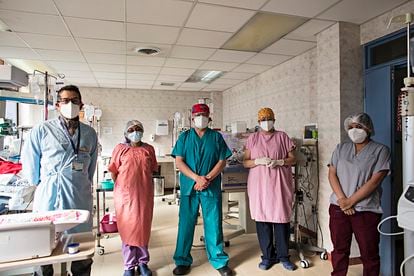Health personnel in a hospital in Bolivia during the covid-19 pandemicPatricio Crooker/World Bank
From the reopening of schools, to the end of preventive isolation and mass vaccination, much has been said about the recovery of post-pandemic countries.
However, the system that has not stopped in the last two years and has undoubtedly been strongly affected in a consistent manner, is the health system.
Both the shortage of hospitals and health centers, as well as the quality of the work environment for professionals have been affected by the uncertainty and the shortage of emergency funds.
As we move towards the post-pandemic, it is imminent to position the conversation at the policy level to strengthen this sector that urgently needs a cure.
Jeremy Veillard, Senior Health Specialist for the Latin America and Caribbean Region of the World Bank, explains in this interview the state of post-pandemic health systems and the lessons that must be taken into account in the long term in the region.
Ask.
What have been the consequences of the pandemic on the health systems of Latin America and the Caribbean?
Response.
The pandemic has had devastating consequences on health systems in Latin America and the Caribbean in 2020, with some recovery in 2021. Access to essential health services was greatly disrupted at the start of the pandemic, due to strict isolations in the region, out-of-pocket expenses to access health services, the reluctance of people to seek medical care for infections, and a new prioritization of human talent from the health area to public health and ICUs.
The impact of the pandemic on health professionals has been brutal - many have been infected or lost their lives due to the pandemic, others are worn out by the enormous pressures of work during this period.
There is also concern about the interruption or postponement of essential health services:
immunization rates for children have decreased, people with chronic illnesses have been unable to access services, young people suffer from mental health problems, and access to preventive and screening services has been greatly affected.
In the long term, all of this will have repercussions on health systems, in terms of loss of life and disability that could have been avoided and in terms of the impact on the financial sustainability of health systems.
P.
There has been a lot of talk about economic reactivation and going back to school, what should we expect from the health systems in the post-pandemic region of Latin America?
R.
The pandemic has shown significant gaps in pandemic preparedness and response, and the need to break a chronic underinvestment in public health emergencies.
In the aftermath of the pandemic, governments should be expected to make the necessary investments in public health preparedness and response, starting with stronger laboratory and surveillance networks, investments in the public health workforce, and investments in better information systems to track and adapt to the dynamics of epidemics and future pandemics.
In addition, it will be essential to strengthen health systems by focusing on more resilient primary health care, capable of assisting with surveillance and response to public health emergencies.
Finally,
Q.
In terms of investment, what should be the priorities for health systems in this context of recovery and uncertainty?
R.
Priority must be given to investments in the recovery of essential health services, such as immunizations for children, school feeding programs and other nutrition services, planned surgeries that were postponed and, of course, making sure that People with chronic illnesses have access to services to manage their illnesses.
In addition, governments should invest in better preparedness for future pandemics, especially in strengthening their surveillance and information systems, and basic public health capacities, including access to strategic supplies such as vaccines.
Finally, investment must be made in high-performance primary health care focused on prevention and the provision of quality services to citizens when they need it and where they need it.
Q.
What lessons has the pandemic left and how can they be put into practice in the region's health systems?
R.
We have seen a lot of innovation to improve access to services: for example, Colombia has increased tenfold the number of telemedicine consultations provided during the pandemic.
This also applies to other innovations, such as online bank accounts offered to the poorest to receive social protection benefits during periods of isolation.
Digital transformation remains key in the region, as does the use of technology to improve access to care when needed.
However, access to care does not always mean access to quality care, which is what people want.
Focus on leveraging technology to improve quality of care, especially for people who are most vulnerable or who live in remote areas,
Cecilia Martínez Gómez
is a communications consultant for the World Bank.

